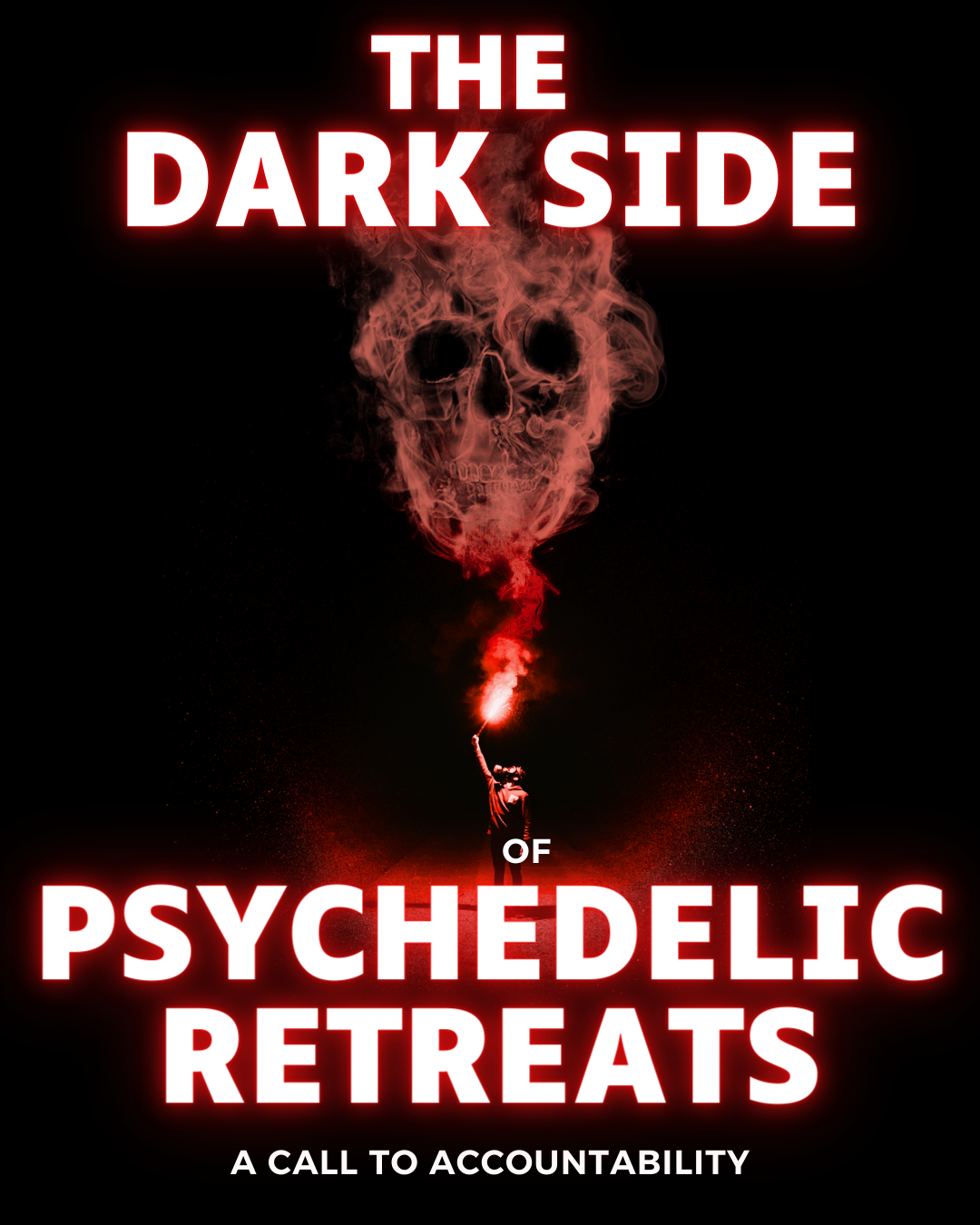In a landscape where the promise of transformation is ever-present, the reality can be far darker than many imagine. The psychedelic retreat space, a growing market that appeals to individuals seeking profound change, is fraught with complexities that can’t be ignored any longer.
As a consultant for high-end retreats and a facilitator of private psilocybin retreats, I’ve had the privilege—or rather, the alarming experience—of witnessing the underbelly of this industry. Today, I want to shed light on this dark corner not to vilify it but to initiate urgent reform.
The Problem Points in Psychedelic Retreats
Lack of Self-Accountability Among Facilitators:
It’s unnerving to witness facilitators who don’t do their own inner work. While they may guide others in their emotional and psychological journeys, they lack the self-awareness that comes from their own healing process. The result? They end up projecting their unresolved issues onto vulnerable participants or their co-facilitators.
Deep Dive into the Need for Self-Accountability Among Facilitators
When a person signs up for a psychedelic retreat, they are embarking on a deeply vulnerable journey. They put immense trust in their facilitators, who are meant to be their guides in navigating this profoundly transformative experience. Hence, it is disconcerting to realize how many facilitators fail to take accountability for their own internal landscape.
Self-accountability for facilitators isn’t a nicety; it’s a necessity. A facilitator who avoids their own inner work becomes a breeding ground for dysfunction. This could manifest as ego-driven behaviors, unchecked biases, or even re-traumatizing participants by projecting their unresolved issues onto them. As a facilitator, if you’re not consistently working on your issues, you are likely to spew them onto others, creating a toxic retreat environment. This is not just unethical but also spiritually irresponsible.
We, as facilitators, owe it to ourselves and our participants to be in a constant state of self-inquiry and evolution. It’s only when we are in tune with our inner selves that we can provide a secure, empowering space for others. We cannot escape the inner work; it is foundational to our role. Let’s commit to regular psychological assessments, self-reflection, and, yes, our own therapy, to ensure that we are truly fit to guide others on their healing journeys.
Absence of Supervision:
In my capacity as a doctor and therapist, I’ve always stood by the critical need for professional supervision. This not only ensures accountability but also helps us navigate the complex emotional terrain that therapeutic work often involves. Without this, mistakes are made, boundaries are crossed, and the people we aim to help are the ones who suffer.
The Critical Role of Supervision in Facilitation
The oversight of a more experienced professional is a hallmark of any credible healthcare or therapeutic profession. This idea is not just confined to conventional medicine; it is a universal tenet that holds true in any space where we deal with the vulnerable human psyche. Yet, astonishingly, supervision remains a glaring omission in the psychedelic retreat landscape.
The absence of supervision in this space can have calamitous consequences. Let’s start with the most glaring: When we err, and we all do, who holds us accountable? Mistakes in this domain are not just professional lapses; they can be life-altering, bordering on life-threatening. When boundaries are crossed, be it physical or emotional, it is often a sign of a facilitator working in a vacuum without the critical feedback loop that supervision provides.
Professional supervision isn’t just about preventing errors; it’s about personal and professional growth. A supervisor helps us see our blind spots—those aspects of our behavior or thought patterns that we can’t see ourselves but that could be negatively affecting our practice. Think about it as a mirror that reflects not just your face but your psyche.
Supervision is also a place where facilitators can openly discuss challenges that arise from the practice, such as projection, transference, and countertransference, including sexual or erotic feelings towards clients. All of these are nuanced issues that require a guided, experienced hand to navigate.
As someone who comes from the world of conventional medicine, where supervision is sacrosanct, I find its absence in psychedelic therapy deeply unsettling. If we are to move forward, establishing a framework for mandatory supervision needs to be a top priority.
We must integrate supervision into our professional practice to ensure we’re not just ‘doing no harm,’ but are actively contributing to the well-being and holistic growth of our clients. After all, we’re working with people at their most vulnerable and open—we owe them nothing less than our best, most well-examined selves.
Misguided Leadership:
Retreat managers and organizers with untreated personal issues can create an unsafe environment for both staff and participants. Sacred medicines demand a sacred approach to healing, something you can’t offer if you’re wrestling with your unresolved traumas or narcissistic tendencies.
The Consequences of Misguided Leadership in the Psychedelic Space
When you step into a role of authority, especially in a space as sensitive as psychedelic retreats, your personal issues aren’t just your own—they echo throughout the organization, influencing staff dynamics and participant experiences. The repercussions of misguided leadership, therefore, aren’t just individual; they are collective.
A retreat manager struggling with unresolved trauma, PTSD, or even a megalomania complex, is like a ship captain with a broken compass. Such individuals often create a destabilizing, unsafe environment, unintentionally or otherwise, that can potentially harm both staff and participants. This is antithetical to the ethos of what psychedelic retreats are meant to be—a sacred space for deep healing and transformation.
Sacred medicines deserve sacred respect and that extends to every facet of organizing a retreat. This means that if you’re going to take up the role of a leader, you must be in a place where you’re doing consistent work on yourself. Just like facilitators, leaders need to be in ongoing therapy or under some form of shamanic care or spiritual oversight. You can’t effectively guide others through their shadows if you’re unwilling to face your own. Let’s make a pact to keep each other accountable for our own personal development if we’re to step into leadership roles.
The Perilous Business Model:
Operating a retreat isn’t just a spiritual calling; it’s also a business. Unfortunately, the current models are often unsustainable, leading to poor wages for those involved. This not only fosters exploitation but also sacrifices the quality of care provided.
The Unsustainability of the Current Retreat Business Model
While many of us get into this space because we feel a spiritual calling, the harsh reality is that operating a retreat also involves dealing with the complexities of running a business. Yet the business model for many retreats is riddled with glaring flaws that are neither economically nor ethically sustainable.
Take, for instance, the issue of fair wages. Retreats are multi-layered operations that involve various professionals, from medical staff to shamans to musicians. Each individual’s time, effort, and expertise have value, and when you’re running retreats back-to-back on a shoestring budget, something has to give. All too often, it’s the wages. This exploitation creates a vicious cycle of low morale among staff, which inevitably impacts the quality of care provided to participants.
What happens when quality is sacrificed? It not only tarnishes the reputation of the center but also threatens the very mission these retreats are supposed to serve—profound, holistic healing. A retreat that compromises on the well-being of its staff can never provide a fully nurturing environment for its participants. It’s a lose-lose situation that needs addressing.
This problem isn’t just about fair wages, it’s about the soul of the endeavor. Are we willing to compromise on the integrity of this sacred work for the sake of higher margins or more clients? We need to be careful because it’s not just our reputation on the line; it’s the well-being of every soul who walks through our doors.
Therefore, it’s essential to revisit and revise the business model. It may mean charging more for the service to ensure fair pay, taking fewer clients, or exploring alternative revenue streams. But above all, it means putting the welfare of all involved above everything else, and that’s a price worth paying.
Churn & Burnout:
Retreat centers that prioritize quantity over quality inevitably fail their staff and participants. I’ve witnessed too many talented facilitators burn out from the relentless schedule, all because they felt trapped in a system that values numbers over well-being.
A Cautionary Tale
When retreat centers become volume-centric, treating their psychedelic sessions as an assembly line rather than as sacred gatherings, the implications are disastrous. The focus shifts from quality of experience to quantity of attendees, putting unbearable pressures on facilitators and leading to eventual burnout.
The pace can be relentless. Facilitators find themselves booked back-to-back, sometimes handling deeply emotional and psychologically taxing ceremonies without adequate time for self-care or reflection. These exhausted facilitators are then less equipped to manage the complex dynamics that can arise in a psychedelic retreat. The damage is two-fold: facilitators’ health deteriorates, and the quality of support offered to participants diminishes.
This is not merely a matter of inadequate rest. It’s about respecting the sanctity and complexity of the healing journey that each facilitator and participant is on. When centers prioritize numbers over well-being, it sends a distressing message about what they truly value. And let’s be clear—people are not disposable. They’re not cogs in a wheel to be replaced when worn out, especially not in a setting as intimate and fragile as a healing retreat.
Avoidance of Conflict:
When feedback is eschewed for the sake of comfort, growth is stunted. Leaders need to rise to the occasion and constructively critique what is working and what is not. The absence of this dialogue creates a toxic environment in a setting that should embody integrity and transparency.
Fostering a Culture of Silence
Leadership in the retreat setting requires a maturity that can handle discomfort, especially when it comes to giving and receiving feedback. Not only is feedback vital for personal and professional growth, but it also ensures that the retreat environment continues to improve and evolve.
Avoiding difficult conversations for the sake of temporary comfort undermines the potential for growth and sets a dangerous precedent. It fosters a toxic environment, one in which people become increasingly hesitant to express their concerns or share constructive criticism. This stifles growth and breeds resentment in a space that should, above all, stand for integrity, openness, and honest communication.
If we’re to create a culture that honors the transformative potential of psychedelic therapies, then we must have the courage to lean into discomfort and confront the issues that need addressing. We need to cultivate a culture of feedback, even when it’s hard, especially when it’s hard.
Abuse of Power:
Despite comprehensive screenings and interviews, sexual abuse is occurring in both North and South America retreats. This is a grim reality we can’t afford to turn a blind eye to.
The Unspoken Scourge
It’s a somber topic and one we’d rather not think exists in this space, but the abuse of power—specifically sexual abuse—is a reality we cannot afford to ignore. Despite elaborate interviews and screening processes, there are those who slip through the cracks and exploit the vulnerability that such intimate settings often engender.
This is occurring on our watch—in North and South America, and likely elsewhere—and it is an abomination to the sanctity of what we aim to offer: a safe space for deep emotional, psychological, and spiritual healing. Turning a blind eye is not an option. We need to recognize that power imbalances exist and can be exploited. This demands not just stricter screening processes but ongoing monitoring, as well as an established channel for complaints and concerns that ensures the safety and anonymity of the complainant.
Enough is enough. The time for sweeping these uncomfortable truths under the rug is over. We must rise to protect the sanctity of this space and the well-being of all those who enter it. Let’s insist on accountable structures and supervision, let’s commit to creating safe, sacred spaces, and let’s vow to act swiftly and decisively when those standards are not upheld. The integrity of this transformative work depends on it.
A Call to Action
We are at a pivotal point where a lack of stringent guidelines and structures could very well undermine the transformative potential of psychedelic retreats. The time to act is now. Here’s what we urgently need:
– Establishing regulatory bodies and accreditation for psychedelic facilitators and retreat centers.
– Implementing mandatory supervision and ongoing therapeutic work for all facilitators and staff.
– Creating a transparent financial model that honors all involved, from the participants to the support staff.
– Introducing systems for regular feedback and conflict resolution.
– Formulating emergency protocols to deal with abuse and exploitation.
As someone deeply committed to the sacred potential of these ancient medicines, I implore each of us in this space to be honest, to seek the supervision we all need, and to operate from a place of true integrity. For this industry to evolve, we must first evolve ourselves. Let’s pave a new path forward, one that is aligned with the sacred responsibility we’ve been given.







